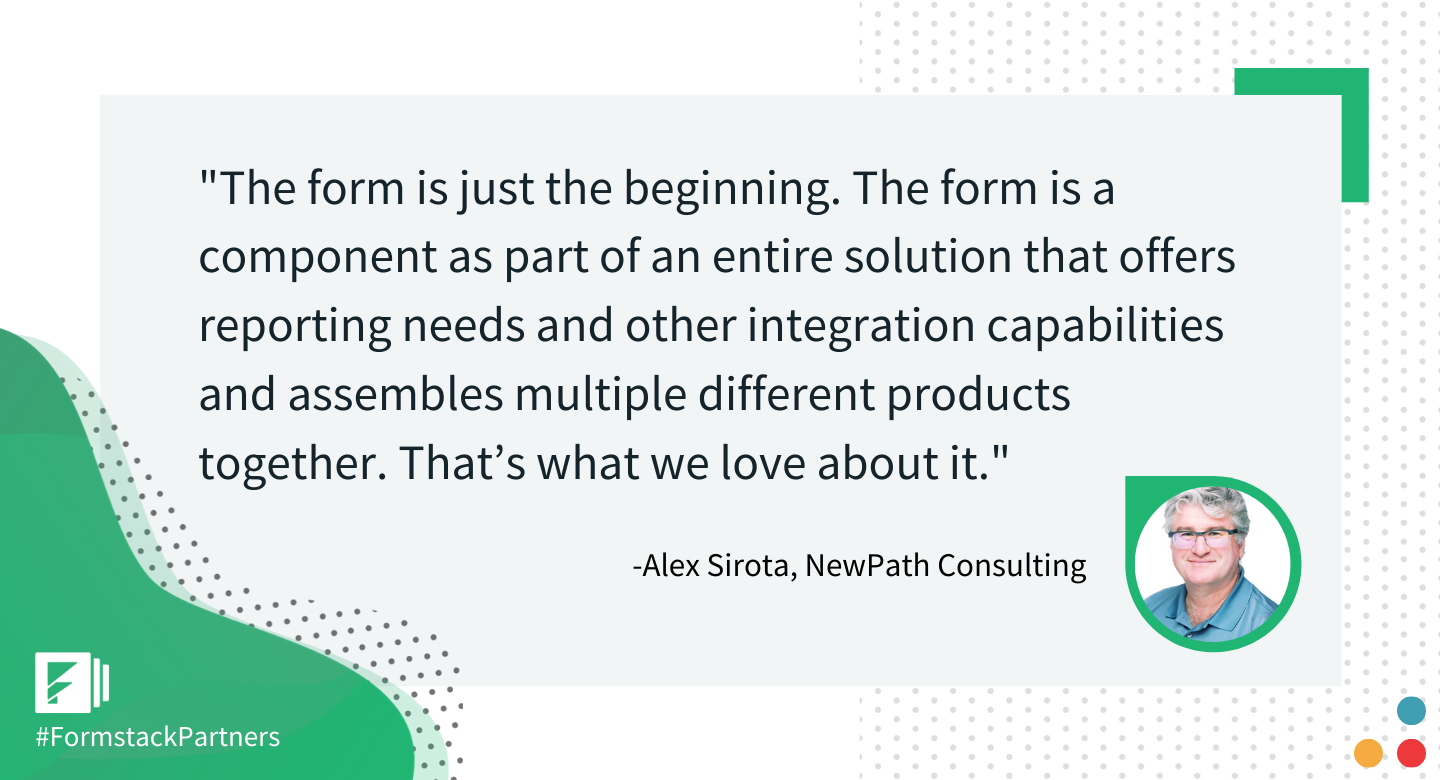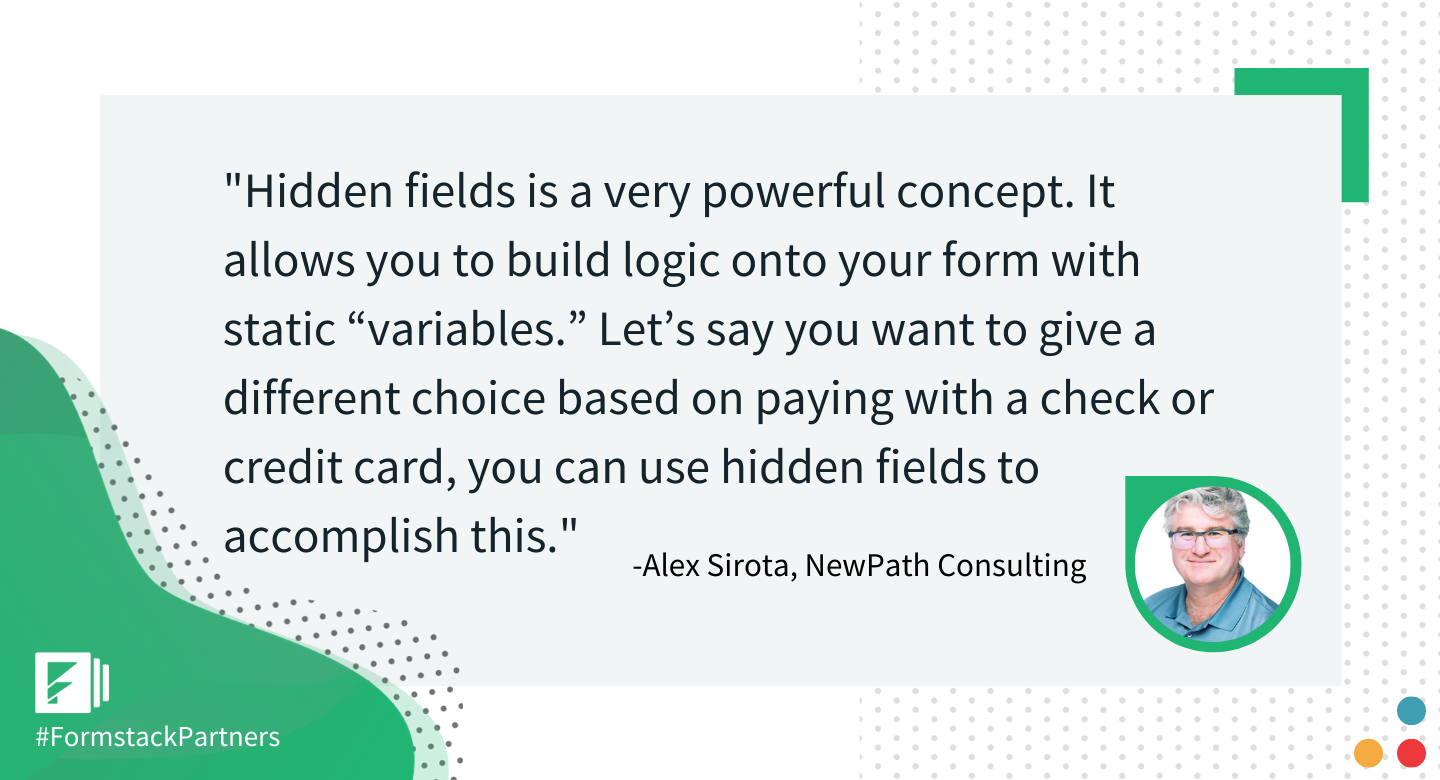Our VP of Partnerships Zak Pines recently sat down with Alex Sirota, Director of NewPath Consulting, as part of our ongoing Partner Interview Series. Zak and Alex discussed NewPath’s history as a Formstack partner and going beyond the form. Alex also provided—by far—the most in-depth answer to Zak’s hot dog question yet. Here’s an abridged transcript of the conversation.
Background on NewPath Consulting & Getting Started with Formstack
Zak: Alex, I know you have a long history with Formstack, and I’m excited to talk to you today. When did you first start working with Formstack? I know it goes back many years.
Alex: In 2009, I was with the Ontario government working on various electronic service projects, and I started looking for a better way to build online forms. I was tired of waiting for forms to be built from scratch. I did a search, found Formstack, and created my own personal account to get started.
Zak: So you’re at your 10-year anniversary working with us.
Alex: Yes, I’ve seen it evolve from a solution for forms automation to a workplace productivity platform.
Zak: I want to hear more about your work with Formstack. But before that, can we take a step back to your background prior to starting NewPath Consulting?
Alex: I grew up in Detroit, Michigan, and went to the University of Michigan to study computer science. After graduating, I started working for Apple in their customer service department for their enterprise-level software and hardware products.
Zak: Apple. I’ve heard of them.
Alex: Yes. I worked in the Austin call center on the Apple reporting systems at a time when Apple offered free support. I then worked for different technology startups—one that tied your database to your website, and then an email marketing product.
Then I moved to the role at the Ontario government, where we built automation systems for grant management. That experience taught me a lot about small businesses in the area of economic development, as we worked with a lot of nonprofits and small businesses. From there, I wanted to run my own business, so I started NewPath with a focus on partnering with SaaS companies and helping their customers get the most impact from software services. NewPath started working with Formstack as a partner in 2013.
Customer Stories: Going Beyond the Form
Zak: Can you share an example of a customer use case?
Alex: We have a nonprofit community band here in Toronto, Resa’s Pieces. They wanted to sell tickets online for their concerts and sponsorships, and originally, they were creating forms manually on paper. We brought in Formstack to give them a productized solution to customize and manage their forms to sell tickets. They’ve been using Formstack for six years now and continue to sell tickets for multiple different events while also selling sponsorships—all through our automated solution based on Formstack and a Google Sheet integration. They use Google Sheet Dashboard for analytics to report on sales progress, which generates over $30K a year in revenue.
Zak: You had me at Resa’s Pieces; that’s a great name. But that is a really good example of a small organization being able to set up not only a form, but their own online ordering and credit card processing right on their website.
Alex: Yes, the form is just the beginning. The form is a component as part of an entire solution that offers reporting needs and other integration capabilities and assembles multiple different products together. That’s what we love about it.

I’ll give you another example. We had a camp that wanted to create a dynamic set of forms for all kinds of registration scenarios.
When we move a customer online, we show them how they can use Formstack Conditional Logic to make it a better user experience and get a higher response rate on their form. Instead of filling out a long form, you only need to fill out what is relevant to you. There are branches and different paths. There are so many interactive things that happen with forms.
A Better Way to Capture Data
Zak: So your customers probably have an “aha moment” where they realize there’s a better way to collect data?
Alex: Our customer engagement always turns into customers wanting to figure out how they can ask questions in a better way. They go beyond the form—beyond their original form into a far better way to capture data.
That also ties to what they do with the data. For example, we have several customers who take data from forms and then use Formstack Documents to create documents using that data.
Zak: So a local band, a camp...you have quite an assortment of customer use cases.
Alex: Ha, that is just the beginning. We’ve done scholarship applications, custom certificates, grant applications….
Zak: Are you seeing use cases for secure data collection on forms? I ask because our HIPAA compliant form offering is the fastest growing segment of our business.
Alex: We had a very interesting project with a clinic that wanted to automate the collection of complex medical testing information. They were conducting customer interviews for a particular set of genetic screening, and they were trying to create PDF-based forms for multiple requisitions from several clinics. Each of those forms have around 200 fields.
Zak: That sounds painful. 200 fields!
Alex: Well, using Formstack, the questionnaire dropped to just 20-30 questions based on multiple Conditional Logic capabilities. They’re now able to create a dynamic PDF, save time, and create a more user-friendly experience for the customer.
Zak: What does your process look like in working with customers?
Alex: I make it a point to explain to new customers that our work together is going to be less about programming and more about discovery of what their business processes should be. We talk about what it is now and where they want it to be.
Our customers typically want a quick automated solution, which we tend to do on the first pass. But I also want them to understand that we’ll iterate and continue to build on the processes to get them to a better place. The good thing is, using Formstack means they have access to a rapid prototyping tool, so you can quickly get set up and get the optimization process down, but the real value is in iterating over time.
Zak: You have a ton of experience using Formstack. Do you have a favorite feature?
Alex: Hidden fields is a very powerful concept. It allows you to build logic onto your form with static “variables.” Let’s say you want to give a different choice based on paying with a check or credit card, you can use hidden fields to accomplish this. I use hidden fields in just about every implementation to store or calculate information behind the scenes.

Lightning Round
Zak: What are some of your personal interests or hobbies, Alex?
Alex: I went to University of Michigan and played with the marching band.
Zak: What instrument?
Alex: I’ve played trumpet since the fifth grade, and I still play. I played in the Rose Bowl in Pasadena, and we played at Disney World in Florida. At Michigan, I played every Saturday in front of 100,000 people!
Zak: Can you share your favorite productivity tip?
Alex: We use an online scheduling tool called Appointlet. It saves so much time to have people book meetings right on your calendar and eliminate the back and forth.
Zak: Do you have a favorite TV show?
Alex: Not really. I recently watched “Unbelievable” on Netflix. Extraordinary story!
Zak: What's your go-to lunch on a workday?
Alex: Leftovers or a light lunch, like a salad or sandwich and some soup. I’m not terribly adventurous when it comes to food.
Zak: Last question is a fun one, and it’s also food-related. Is a hotdog a sandwich?
Alex: A sandwich is meat, cheese, or veggies between two pieces of bread. I’d probably say no. There’s a lot of different opinions. I would say a hamburger is a sandwich between two flat pieces of bread. I don’t think of it that way, though. A hot dog is a very different form of food. I eat sandwiches way more than I eat hot dogs. With hot dogs, it’s almost always at a barbecue. And they’re not the most appealing form of food. A sandwich you can make healthy. I think of sandwiches as a healthy food.
Zak: That’s the most in-depth answer I’ve gotten!
Alex: I guess that reflects my analytical mind.
Looking for your next step? Check out Formstack’s partner program for consultants, agencies, and tech partners.











